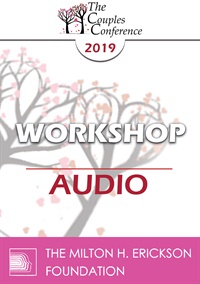CC19 Workshop 03 - The Fundamentals of Relational Life Therapy (RLT) - Terry Real, LICSW
Total Credits: 2.0
- Average Rating:
- Not yet rated
- Topic Areas:
- Workshops | Couples Therapy | Relational Life Therapy Model (RLT)
- Bundle(s):
- CC19 Main Conference Audio Bundle | CC19 Individual Selections
- Categories:
- Couples Conference | Couples Conference 2019 | Pioneers in Couples and Family Therapy
- Faculty:
- Terry Real, LICSW
- Duration:
- 1:02:19
- Format:
- Audio Only
- Original Program Date:
- Apr 12, 2019
- License:
- Never Expires.
Description
Description: This presentation outlines the core phases of Relational Life Therapy (RLT): confronting dysfunctional patterns, inner child work, and teaching relational skills. Emphasizing extended sessions and multi-generational trauma, the approach targets power imbalances, grandiosity, and false empowerment. The goal is to foster deep connection and sustainable change through truth-telling, accurate diagnosis, and strategic leverage.
Syllabus Description: Relational Life Therapy (RLT) produces deep, lasting change in couples quickly by breaking many cherished couple’s therapy rules. We take sides, for example. Not all problems are fifty-fifty. We judiciously self-disclose. We’re in it with you. We work with trauma in each partner, doing deep individual work in the presence of one another. We pay close attention to gender – the unique characteristics of men and women in our culture and how those differences collide. We work with issues of both shame and also of grandiosity. We explicitly address power imbalances, and rebalance them.
Through lecture, demonstration, and video excerpts of real sessions, workshop participants will learn how to join through the truth, the art of holding the mirror up to our clients in ways that not only leave them feeling you are on their side, but that you are actively rooting for them.
Educational Objectives:
- Identify the systemic dynamic, the repeating vicious circle, the couple is stuck in.
- Identify each partner’s self-defeating stance, (angry pursuer), their contribution to the dynamic between them.
- Demonstrate understanding of the clear map of the repeating loop the couple is mired in.
- Utilize their relational diagnosis to wake them up to their patterns of dysfunction and wish to connect.
*Sessions may be edited for content and to preserve confidentiality*
Credits
Handouts
| WS03 TRANSCRIPT (116.5 KB) | Available after Purchase | ||
| Terry Real - High Impact Couples Therapy (1.3 MB) | Available after Purchase | ||
| Terry Real - Joining Through the Truth (1 MB) | Available after Purchase | ||
| Terry Real - Long Shadow (2.3 MB) | Available after Purchase | ||
| Ericksonian Learning Snapshot (249.4 KB) | 2 Pages | Available after Purchase |
Faculty

Terry Real, LICSW Related Seminars and Products
Terry Real, LICSW, is a nationally recognized family therapist, author, and teacher. He is particularly known for his groundbreaking work on men and male psychology as well as his work on gender and couples; he has been in private practice for over twenty-five years. Terry has appeared often as the relationship expert for Good Morning America and ABC News. His work has been featured in numerous academic articles as well as media venues such as Oprah, 20/20, The Today Show, CNN, The New York Times, The Wall Street Journal, Psychology Today and many others.


